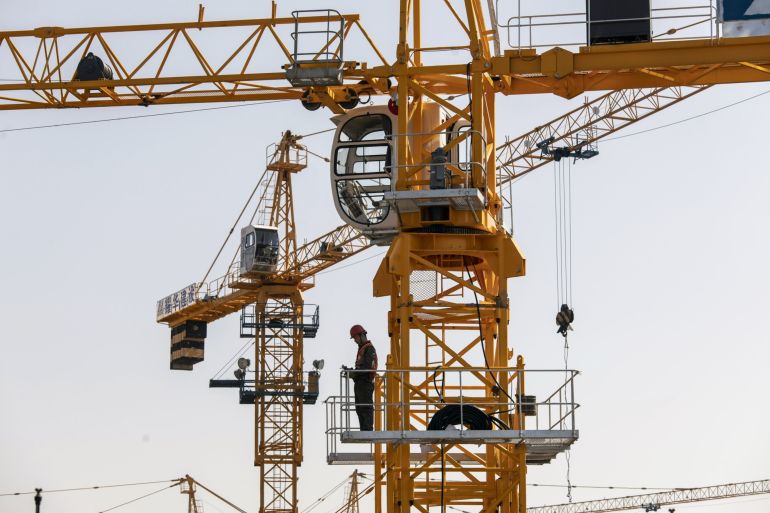China leans on state-run banks for $120bn to boost economy
The recently announced stimulus will go to boost infrastructure investment and is part of an old playbook to drive growth.

Beijing is turning to state-owned policy banks once again to help rescue an economy under strain, ordering them to provide 800 billion yuan ($120 billion) in funding for infrastructure projects.
The stimulus, announced at a State Council meeting chaired by Premier Li Keqiang, could help finance a significant chunk of infrastructure costs this year and give some relief to local governments grappling with plunging revenues.
Keep reading
list of 4 itemsChina’s industrial profit falls sharply in April amid COVID curbs
Fiji to join Biden’s economic framework aimed at countering China
Is China the ‘most serious challenge’ to international order?
President Xi Jinping has called for an all-out effort to boost infrastructure this year, turning to an old playbook of driving up growth through public investment. Funding the extra spending has proven to be tricky though, after a plunge in land sales and widespread Covid outbreaks battered government revenue.
“We think the three key ingredients for investment — projects, financing and incentive — are all falling into place this year,” said Ding Shuang, chief economist for Greater China and North Asia at Standard Chartered Plc. “The additional 800 billion yuan loans from policy banks will help fill the financing gap if any.”
Standard Chartered forecasts infrastructure investment will grow 10-15% this year, although that may still not be enough to offset the headwinds to economic growth. Bloomberg Economics estimated China’s infrastructure spending came to 23 trillion yuan in 2021.
Beijing’s calls for faster implementation of growth-boosting policies have intensified since official data showed that economic activity contracted in April and unemployment rose sharply. High-frequency indicators suggest the decline continued in May, leading Li to warn last week of risks from a possible year-on-year contraction in the second quarter.
Nomura Holdings Ltd. estimates the government has a 6 trillion yuan funding gap this year, created in part by a sharp contraction in revenue from land sales, a key source of funding of infrastructure investment by local governments. The 800 billion yuan funding announced by the State Council accounts for nearly half of the 1.65 trillion yuan in new policy bank lending in 2021, economists led by Lu Ting wrote in a note.
Finding Support
China’s policy lenders include China Development Bank, the Agricultural Development Bank of China and the Export-Import Bank of China. They are considered key stabilizers of the economy, and are often called upon to provide financing support for big projects, including infrastructure.
In 2014, for example, the policy banks were asked to help provide funding to the nation’s shantytown renovation projects. They were also urged to step up financing for major investment projects earlier this year as part of China’s broader efforts to support businesses hit by Covid.
The State Council didn’t say in its latest announcement how the policy banks would fund the lending. The development banks’ main source of funds come from issuing bonds or loans from China’s central bank.
The banks may be able to raise the money by selling bonds — likely long-term ones with tenors of five, 10 or 20 years — to fund an expansion in credit, according to economists from Nomura, NatWest Group Plc. and Australia & New Zealand Banking Group Ltd.
And the People’s Bank of China could cut the reserve requirement ratio, or the amount of money banks have to keep in reserve, by another 50 basis points to support the financial market with liquidity, said Liu Peiqian, chief China economist at NatWest Group Plc.
Special Bonds
Policy bank-led funding could also alleviate pressure on the government to ramp up borrowing in other ways, such as selling special sovereign bonds.
“This has to an extent reduced the likelihood of issuing additional local government special bond or special sovereign bonds,” said Bruce Pang, head of macro and strategy research at China Renaissance Securities Hong Kong Ltd. Those special bonds have been advocated by some as a way to pay for extra stimulus to boost the economy, but they’d also be a risk, adding to the already rising national debt.
Despite the stimulus, China’s growth outlook will depend on how the government manages Covid outbreaks going forward. Economists forecast gross domestic product growth of 4.5% this year, well below the government’s target of about 5.5%. Some banks like Nomura are predicting growth as weak as 3.9%.
Covid cases have moderated in recent weeks, leading to an easing of the lockdown in Shanghai. Still, the government’s strict Covid Zero policy, which requires restrictions on activity wherever outbreaks occur, means that consumption is likely to remain muted.
“The Shanghai lockdown has been an outlier so far, but as a minimum we should expect more outbreaks requiring some level of restrictions,” Allan von Mehren, China economist at Danske Bank A/S, wrote in a note.